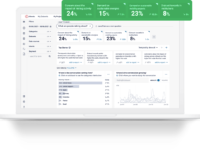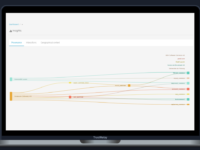With the Quality Tools an organisation can evaluate, monitor and compare the quality and use of its services within and between organisations. The tools include a Self-assessment, Customer Feedback and Utilisation Rate Measurement tool and are free of charge. The tools were developed primarily for public sector organisations to help them develop customer-oriented digital services and improve knowledge-based management. On a national level the tools provide data on the state of digitalisation.
Innovation Tag: Data
We live in an infodemic context. A lot of data doesn't mean good data. This brings to question the information sources and the data itself. Decision-makers don’t understand citizens’ needs and act based on uninformed decisions, and citizens feel neglected. This generates a systemic lack of trust. Citibeats' ethical AI makes helps governments interpret the huge quantity of data exchanged every day by citizens in real time, understand their needs, and make faster and better-informed decisions.
In 2021 Statistics Canada, Canada’s national statistical agency, successfully implemented a new strategy for coding write-in responses to questions asked on the Census of population. Fasttext, a natural language processing algorithm, was applied to 31 questions and approximately 7 million write-in responses that would have in the past been completed by human coders. This innovation significantly increased the coding efficiency by decreasing the time and cost required to code the 2021 Census.
Case Study
Personalized feedback service for national qualification test result – Digital Mentor Service…

"Why did I fail? How should I develop my career?" To address such concerns, we developed the Digital Mentor Service of National Qualification. It leverages massive data on national qualification tests to identify each individual's weaknesses and why they fail. It also provides personalized information by matching examination history with jobs and training offered by government agencies. Supporting test takers from skills assessment and development to job placement.
Educating youth about diversity and the importance of empathy is difficult and dull using traditional classroom methods. Our team of unpaid volunteers built an interactive fiction mobile game, where youths can experience life as somebody unlike themselves, make choices, and reflect on how we treat each other. The feedback has been tremendous - teachers, students, and even adults love the stories and our data analytics indicates real positive impact on individuals who have played the game.
The Government of the city of Lucerne is piloting a new "digital cooperative" model, which allows public sector, private sector and citizens to contribute with data and get remunerated (financially or otherwise). Through this digital coopoerative, the population is able to tackle important and/or urgent issues that affect all its residents using data-driven decisions. For the initial stage, the data and issue tackled is related to mobility.
Digitalization of government often refers an individual project but should include on-going projects. Our city has been building the foundation that allows us to digitalize pubic services simultaneously. Shibuya collects city data and make it open so that innovators could collaborate with us. Secondly we educate our people. Shibuya provides digital devices to children and senior citizens. Thirdly, we let startups to test their product in the city. Finally we will institutionalize the actions.
Impact Canada Challenges have incentivized innovative solutions in the areas of climate action, housing, food, and health. A quasi-experimental impact assessment approach uses tax data (available in most countries) to assess the effectiveness of Challenges by profiling Challenge participants and comparing business performance indicators of Challenge participants vs. non-participants. Requiring only the participant’s business number, this is a no burden, comparative, long-term measurement plan.
Shanghai Data Exchange (SDE) has initiated a new business racing track of data factor market. SDE has independently developed a data trading system named niDts Intelligent Data Trading System, which provides efficient, convenient, transparent and secure data trading services, enabling the market development of data as a production factor, and fueling the digital transformation of economy, life and governance.
A problem for companies and owners of companies is that they need to engage with many different authorities to conduct their business. Instead of building solutions in a siloed approach we aim to build into the ecosystem by integrating different actors and enabling the business to control their own data using blockchains and digital wallets. This is both a new approach and use of a combination of new technologies that benefits the companies.



